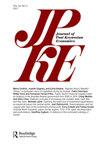The past is only prologue – not the future: response to my critics
IF 1
3区 经济学
Q4 ECONOMICS
引用次数: 0
Abstract
AbstractThis is my response to criticisms of my paper "The Problem with Probability" (JPKE, 2023, n. 3) given by Dequech, Cantillo, and Skillman and Veneziani (also appearing in JPKE 2023, n. 3). The main issues discussed concern the possibility of having knowledge of the future and empirical testing of decision-making models.Keywords: Knowledge of the futuredecision making AcknowledgmentThe author thanks Daniel L. Gordon for his help.Disclosure statementNo potential conflict of interest was reported by the author(s).Notes1 The two other kinds of knowledge are (1) ‘acquaintance knowledge’ obtained by being acquainted with other people or things and (2) ‘knowledge how’ or knowledge of how to do something.2 Of course, a fact is usually defined as something known to be true.3 However, that impossibility can be refuted if it can be conclusively demonstrated that what is impossible actually has been or can be done.4 Panic behavior may be defined as a large increase in buying or selling that occurs in anticipation of a specific event or the occurrence of an unexpected one.Additional informationNotes on contributorsDonald W. KatznerDonald W. Katzner is at Department of Economics, University of Massachusetts/Amherst, Amherst, MA, USA.过去只是序幕,而不是未来:回应我的批评者
摘要这是我对Dequech, Cantillo, Skillman和Veneziani(也出现在JPKE 2023, n. 3)对我的论文“概率问题”(JPKE, 2023, n. 3)提出的批评的回应。讨论的主要问题涉及拥有未来知识的可能性和决策模型的实证测试。关键字:未来决策知识致谢作者感谢Daniel L. Gordon的帮助。披露声明作者未报告潜在的利益冲突。注1另外两种知识是(1)通过认识他人或事物而获得的“认识知识”和(2)关于如何做某事的“认识”当然,事实通常被定义为已知是真实的事物然而,如果能够最终证明不可能的事情实际上已经或能够做到,那么这种不可能性就可以被驳倒恐慌行为可以定义为在预期特定事件或意外事件发生时出现的大量买入或卖出行为。作者简介:donald W. Katzner,美国马萨诸塞州阿默斯特市马萨诸塞大学经济系教授。
本文章由计算机程序翻译,如有差异,请以英文原文为准。
求助全文
约1分钟内获得全文
求助全文
来源期刊

Journal of Post Keynesian Economics
ECONOMICS-
CiteScore
1.70
自引率
10.00%
发文量
23
期刊介绍:
The Journal of Post Keynesian Economics is a scholarly journal of innovative theoretical and empirical work that sheds fresh light on contemporary economic problems. It is committed to the principle that cumulative development of economic theory is only possible when the theory is continuously subjected to scrutiny in terms of its ability both to explain the real world and to provide a reliable guide to public policy.
 求助内容:
求助内容: 应助结果提醒方式:
应助结果提醒方式:


